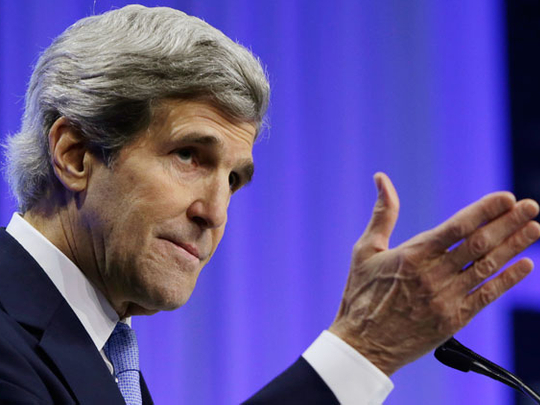
Dubai: US Secretary of State John Kerry’s statements on negotiations with the regime of Syrian President Bashar Al Assad don’t reflect a change in the US approach to the Syrian crisis, Arab analysts said.
The statements just showed “more clarity” in the American position vis-a-vis the Syrian crisis now in the fifth year, they added.
“I don’t see any big change in the US position,” commented Doha-based Syrian Academic and writer Marwan Qabalan.
Qabalan added Kerry has just repeated a known position which says the solution to the Syrian crisis is political and cannot be a military one.
However, what was new in Kerry’s statements is “that the known position was expressed in a different tone; a clearer tone,” he added.
Ambiguous
Other analysts in the region expressed a similar interpretation to Kerry’s statement, but added these statements still reflect an “ambiguous” US stance.
“I don’t see anything new at all,” responded Cairo-based political analyst at Al Ahram Strategic Studies centre Yusri Al Azabawi to whether the statements carried any new approach. “The American position has not changed one inch.”
“America’s position vis-a-vis the Syrian crisis remains as is; ambiguous and not seeking a solution to the Syrian crisis,” Azabawi told Gulf News.
Responding to a question on whether the US is willing to negotiate with Al Assad, Kerry told CBS in an interview aired on Sunday “we have to negotiate in the end.”
“We’ve always been willing to negotiate in the context of the Geneva I process,” Kerry added, referring to a 2012 conference held in Geneva and called for a negotiated transition to end the conflict.
Tens of thousands of Syrians were killed in the conflict and millions were either displaced inside Syria or took refuge in the neighbouring countries.
The Geneva talks between the Syrian opposition representatives and government delegations collapsed after two rounds. Earlier this year, Russia hosted talks between some Syrian opposition figures and government officials. But the talks achieved little progress, and were boycotted by the main Syrian opposition figures.
Damascus-based analyst Abdul Fatah Awad said “it seems there is an American-Russian agreement on the Syrian-Syrian talks,” and that Washington has reached the conclusion that the political solution is the “appropriate solution” to the crisis.
“The Americans have reached the conclusion late. But it is better to be late than never,” he told Gulf News.
Awad added “as a position itself, it is not important (to the Syrian people because they know it). What was important is announcing it in such a clear way.”
No talks with Al Assad
However, State Department spokeswoman Marie Harf said later that Kerry was not specifically referring to Al Assad in his comments. She reiterated the position that Washington would never negotiate with the Syrian leader.
Analysts, meanwhile, differ on the reasons behind the timing of Kerry’s statement.
While Azabawi believed the Syrian crisis is part of the ongoing negotiations between US and Iran on Tehran’s nuclear programme, Qabalan offered a different explanation.
“The Americans are not concerned with what is happening in Syria. Practically, they have handled it to others,” he added.
“The Americans are concerned with the situation in Iraq and what is happening there, including eliminating Daesh.”
It could be that Kerry tried “to appease US allies in the region by saying the US is working on solving the Syrian crisis,” amid increasing criticism to the US position to the development in Syria, he said.
Meanwhile, analysts in the Gulf states were dismayed by the comments.
“How can you sit down and talk to [Al Assad] and keep him in power? It’s a big joke for us,” said Abdul Aziz Al Sager, the Saudi head of the Gulf Research Centre based in Jeddah and Geneva.
“The fact that Al Assad is still in the picture is something we have lived with and accepted as an interim arrangement. If Mr Kerry was talking about this same interim arrangement — one year or two years until negotiations reach some fruit — we understand,” said Sami Al Faraj, a Kuwaiti adviser to the Gulf Cooperation Council.
“But if he means that even after negotiations Al Assad would stay on, that is unacceptable.”
Nasser Al Omar, a hardline conservative cleric with over 1.6 million Twitter followers, tweeted on Monday that Kerry’s comments were evidence of a deal between Tehran and Washington to make Iran “America’s policeman in the region”.
— with inputs from Reuters












